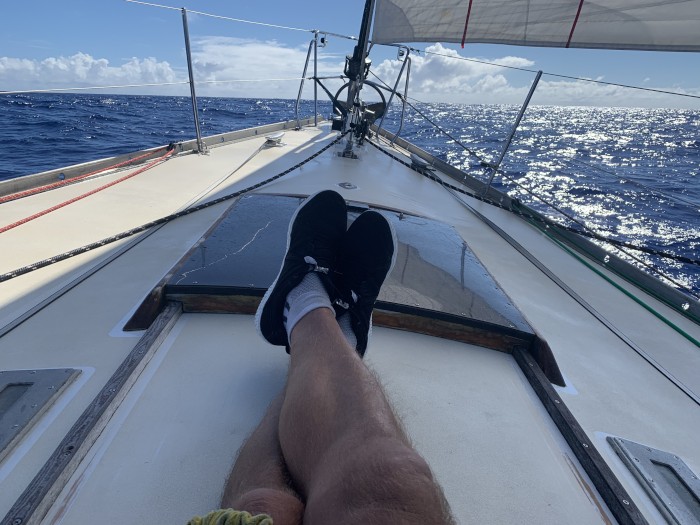We just can't stay away from Isbjorn! Or is it that we just can't get to our own boat??? Either way, on November 7-21 we made a very cool 14 day 1904 mile passage from Annapolis to Antigua on Isbjorn, 59-North's 47 foot Swan. It was the longest passage ever for David and second longest for Kitty after her 2019 Atlantic crossing. Sean Westoby, who we had previously sailed with in the BVI, skippered the boat along with mate Liz and 5 crew: Frederick, a 20-something Danish cargo trader currently living in Washington DC; Marilyn, a retired trauma nurse practitioner from Wilmington Delaware; Eliza, an 18 year old Californian doing a gap year before college; and the two of us.


Departure planning for the trip was complicated by weather and the pandemic. Hurricane Eta was active in the Gulf of Mexico, with a expected path heading north toward the Chesapeake. Additionally, there was a tropical wave off the coast of Africa heading eastward, with the potential to form a second tropical depression near our route. COVID added to the mix. Despite all the precautions taken, we had to prepare for the possibility that a crew member might bring the virus onto the boat, and so we routed close to Bermuda to provide an emergency stopping point. At our destination, Antigua had been allowing sailors to enter after a 14 day "quarantine" at sea, but those rules could potentially change during our passage.
Typically sailors bound for Bermuda from the Chesapeake wait for a cold front to pass and then have a comfortable broad reach on westerly winds to the island. Due to uncertainties with Eta's future path, however, we decided to put distance between us and the storm and departed on Sunday with northeasterly winds. We would sail close hauled or "beat" east toward Bermuda, hoping for the wind to shift more northerly for a more comfortable point of sail.
To "beat" in a sailboat involves sailing as close to the wind as possible, typically involving crashing through the waves in a heavily heeled boat. Beating was an apt description of our 7 day passage to Bermuda ... as in being beaten like an egg, or beaten up on the playground, or beaten into submission... you get the idea. Pounding conditions on confused seas made for difficult sleeping, queasy stomachs, and multiple bruises as we moved about the cabin braced for the next wave to hit. The predicted wind shift from east to north never happened, and we clawed our way upwind all the 700+ miles to Bermuda.
After a few days, our stomachs and bodies adapted to the conditions and we were able to settle into the joys of a long passage. It was a delight to be away from the cacophony of post-election news and to focus on our immediate tasks. When off watch we read, listened to music, chatted and napped. Frederick entertained us with stories peppered with Danish idioms about cows and ice (!), Marilyn with tales of surgical tents in Haiti and Nepal, and Eliza with her teenager's enthusiasm. The lack of a moon meant that night watches brought a show of planets, constellations, shooting stars and the clearest Milky Way I have ever seen. Despite impossible conditions, every night brought gourmet meals that Liz had conjured up over a gimbled stove.
We passed Bermuda 30 miles to the south on the 7th night, just seeing a faint glow on the horizon. We continued eastward to another day and a half, then turned south toward the Caribbean. The air grew pleasantly warmer, but the easterly trade winds that we were expecting were late to materialize due to the impact of the previously discussed tropical wave...Instead we got winds from the south, more close hauled sailing, and squalls with winds gusting to 30+ knots. Dodging the squalls became the sport du jour both at night and during the day. Finally we broke through this unsettled weather and the easterlies arrived along with a long swell from the 2000 mile Atlantic fetch. Frigate birds and shearwaters gave hints that we were getting closer to land, and we finally saw Antigua on the 13th day. Not wanting to risk a lee-shore, we fell off and sailed between Antigua and Barbuda, then short tacked up the south side of Antigua into the evening. We dropped anchor after dark in English Harbor, a quaint harbor which was Admiral Nelson's Caribbean headquarters for the British navy in the 1800s.
The ship and crew logged over 1900 miles on the voyage, virtually all of it under sail, using the engine only for charging the batteries between the Chesapeake and Antigua. It was not an easy passage, but one that gave Kitty and I increased confidence in heading off on our own boat when we can get to her.
So are you curious about our new found knowledge of Danish idioms? It turns out that if a Dane tells you "the cow is off the ice" it means that the current danger has passed. We are home, healthy, and grateful for this shared experience, with the cow currently off the ice.





Comments